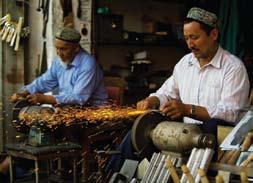
2 minute read
A World Glimpse: Uighurs
MCC Canada receives over $8M for Haiti
Nearly half of relief donations from new donors
WINNIPEG, Man.—MCC Canada has received more than $8.4 million in financial contributions in support of MCC’s response to the Haiti earthquake.
By the end of April, MCC had received nearly 27,000 gifts, nearly half from new donors. Donations were highest in Manitoba, followed by Ontario. Gifts came from individuals, organizations, congregations, schools, thrift shops, foundations, estates, and others.
“It is difficult to adequately express our gratitude,” said Don Peters, executive director. “Thanks to all who responded so compassionately.”
Donations will be pooled with MCC contributions in the U.S. and potential contributions from the Canadian Foodgrains Bank.
In addition to financial gifts, supporters in Canada and the U.S. made it possible for MCC to send thousands of blankets, cans of meat, tarps, first aid kits, sheets, and relief kits (plastic pails filled with towels, soap, shampoo, and other hygienic supplies).
MCC’s multi-year response will include economic development, food programs, housing projects, education and health services, and trauma healing, said Willie Reimer, director of MCC’s food, disaster, and material resources.
MCC Canada collaborates with Canadian Churches in Action, a coalition of nine church-based development and relief agencies in Canada to access government matching funds for Haiti. Gladys Terichow, CCMBC, MCC Canada
Rosette Aime, in her temporary shelter in Port-au-Prince, Haiti, holds up a comforter she received from MCC.
A World Glimpse: Uighurs
Uighurs are a Turkic-speaking Muslim people who live primarily in the autonomous region of Xinjiang, China.
Described by some as Muslim Mongolians who look like Italian peasants, they are generally larger and darker and have more Mediterranean features than Han Chinese. Blue eyes and light skin are not uncommon among them.
They are also known as the Aksulik, Kashgarlik, Uyghur, Uigur and Turfanlik. They are one of the largest ethnic groups in China

and the largest ethnic group in Xinjiang. They have traditionally occupied oasis cities in western China that were once major caravansaries on the Silk Road trade route.
In those days it was said that Uighur merchants could count in 50 languages. Uighurs are descenUighur craftsmen sharpening knives. dants of wolves according to the Uighur creation myth. Chinese are century. For five centuries before descendants of dragons according to that the name “Uyghurs” was used their creation myth. to describe Buddhist and Nestorian
For the most part Uighurs didn’t Christian oasis dwellers in Xinjiang. convert to Islam until the 15th ACS






